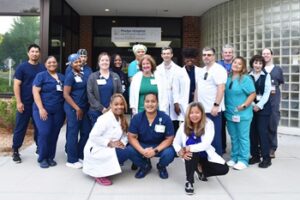Just recently, a soldier killed five of his fellow GIs in Iraq. This was not the first tragedy of this kind, nor is it likely to be the last. The soldiers were at a clinic, where the killer was apparently a patient, and where soldiers can get help for stress-related issues.
It sounds like perhaps more help was needed by this young man.
It is easy, during what has come to be called an "unpopular war," to forget that the men and women serving in the military are simply doing their jobs — a job I would certainly be terrified to do — and that in doing this job, they experience unimagined stress. As we celebrate Memorial Day by eating too much at cookouts and enjoying reduced prices on cars and mattresses, we lose sight of what Memorial Day actually is. It’s not just a day off to kick off summer, it’s a time to remember those who fought for freedom, especially those who fought and never came home.
For some soldiers, surviving war and actually returning home can seem worse than the alternative. What we used to call "shell shock" in the early part of the last century is now listed in the Diagnostic and Statistical Manual of Mental Disorders as Post-Traumatic Stress Disorder, or PTSD. PTSD occurs when someone has experienced a trauma, particularly a life-threatening one, and psychiatric symptoms remain after the threat has passed. Many soldiers have a hard time re-acclimating to life as a civilian because of symptoms of PTSD, which include flashbacks of the trauma, anxiety, depression, sleep disturbances, and panic. Many soldiers don’t know how to talk to their loved ones about what they may have witnessed while at war. The character of Dr. Hunt on the popular show "Grey’s Anatomy" is a good example of a soldier having trouble finding his way back to civilian life. The blades on the ceiling fan brought back memories of military choppers and, in a sleepy haze, he tried to strangle his girlfriend, Dr. Yang. This character has yet to tell his mother that he is back in the U.S. because he doesn’t want to see himself in her eyes and know that the son she said goodbye to has returned a different man. Dr. Hunt’s flashback to war was not just dramatic license to make the show more interesting. I had a boyfriend in high school whose father had served in Viet Nam. His flashbacks were so severe that he had tried to kill this boy when he was a baby. Hearing helicopters, even years after his return from the war, sent him into a tailspin. The sad part is that so many returning soldiers suffer silently in their own private Hell, especially when they return from an unpopular war with no fanfare.
You don’t have to experience warfare to have PTSD. Victims of domestic abuse sometimes experience PTSD symptoms. Those who were present on September 11th, who ran for their lives from burning buildings or saw the planes hit the Twin Towers, suffer from the sleep disturbances and anxiety seen in PTSD. I recently had a very frightening car accident, and for a solid week just felt "not myself." I can’t say that I was having nightmares or flashbacks, but it was clear that I was dealing with a low level of post-traumatic anxiety, complete with forgetfulness, distractibility, and feeling generally scattered. To receive a diagnosis of PTSD one must have been the victim of something life-threatening or witnessed someone have their life threatened or actually be killed. So this would include events such as accidents, violent crimes, acts of war, and natural disasters such as earthquakes. But for many of those events there is a better understanding than there is when returning from war, and people often find it easier to get support.
Returning soldiers have their own specific problems when it comes to post-traumatic symptoms. For one thing, their lives are on the line from the minute they are deployed to the minute they come home. That constant fear and anxiety wreaks havoc on the body and brain and it takes quite some time to recover. Many families expect that when their soldiers return they will be happy to be home and get back to "normal" in no time. And yes, they are usually very happy and grateful to be home, but it’s not like returning from a business trip; it’s like returning to another world. They have lived in a heightened state of arousal for months or years, and have to relearn how not to react when a helicopter flies overhead, or a ceiling fan seems eerily familiar.
Another issue for soldiers is that they are perpetrators of violence and destruction while they are deployed. That’s part of the job. And even though they are desensitized and coached for the brutalities of war, nothing can really prepare them for what it must be like to kill or witness the killing of another person. When soldiers came back from Viet Nam they were taunted with accusations that they killed babies. And, yes, innocent civilians are killed during a war, and I am sure this is a hard reality for a soldier to deal with and, no, he doesn’t need to be reminded that in doing his job there is a tremendous amount of collateral damage left in his wake. Even if you know that the enemy will kill you if you don’t kill him, it can’t be easy to take a life, even to save your own. The memories of that event will live forever.
Many soldiers don’t know how to talk about their experiences. In the book Flags of Our Fathers, one can read about a World War Two veteran who never, in decades, really talked about what he had experienced, but in piecing stories together, it was clear that he witnessed unimagined brutality. Without a person or persons to talk about their experiences, many veterans hold it in, carrying the burden of their experiences, the lives they took, the lives they saw get taken, the fear and danger they experienced every day, without relief. Because so few people can understand what they went through, they feel they can’t unload this trauma, and instead suffer in silence.
I am the president of the Westchester County Psychological Association and some of our members have begun to get involved in working with veterans, giving free or low-cost therapy to those who need it so they don’t have to suffer alone with these memories.
On this Memorial Day, between burgers and beer and baseball, let’s not forget to remember the brave young people who volunteer to put their lives on the line because their Commander-in-Chief tells them to. Let’s remember those who did not return home, and also those who did, but who left a piece of themselves on the battlefields. Whenever I see a soldier in uniform, wherever I am, I always say "thank you," and I am saying it here, for any readers who have served or are serving now. Thank you, for doing a job that most of us would never be brave enough to do.
Barbara Kapetanakes, PsyD., practices child, adult, and family psychotherapy in Sleepy Hollow.






